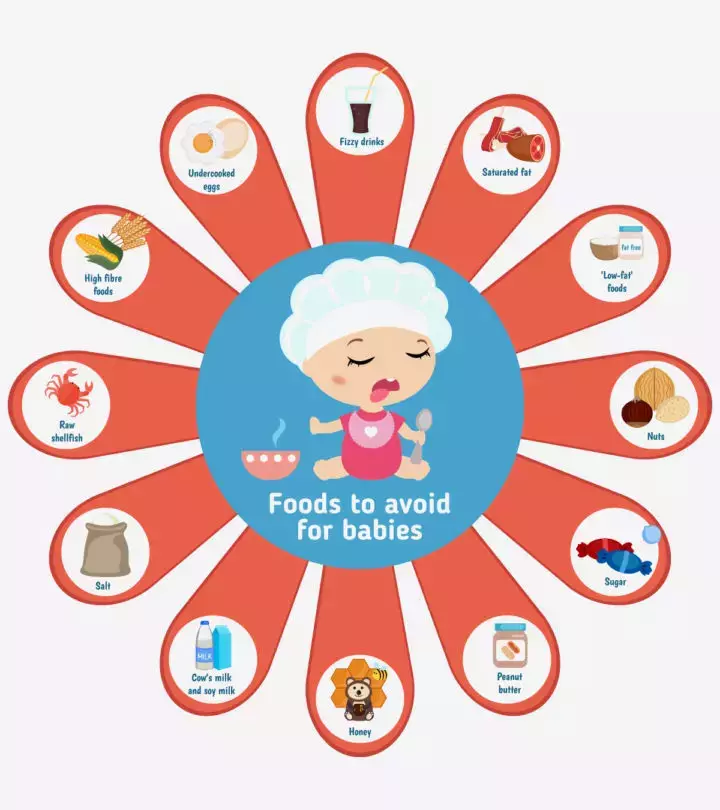
Image: Shutterstock
Complementary feeding is an essential milestone in a baby’s life. A well-growing, healthy baby can eat several solid foods from different food groups. However, this doesn’t mean they can eat everything. Knowing the foods to avoid for babies helps to avoid health hazards. As a parent, understanding which foods pose risks is crucial in ensuring your baby’s safety and health. This post provides a comprehensive list of foods to avoid based on expert recommendations and health guidelines.
The transition from breastfeeding to weaning indicates that the baby is growing well. Babies under 12 months are still developing vital oral skills and have an immature digestive system. Therefore, while selecting age-appropriate weaning foods, parents need to stay mindful of the foods to avoid for babies younger than a year.
So read through this post if you are first-time parents looking for a list of foods to avoid for babies. It also gives you an overview of foods you should avoid feeding your baby until they reach 12 months of age.
Key Pointers
- Do not give refined sugar and honey to newborns under 12 months.
- Whole cow milk is also not suitable as it lacks nutrients essential for their growth and development.
- Fruit juices add no nutritional benefit for newborns less than one year.
- Raw vegetables and fruits and sticky food, such as jelly cubes, are likely to cause choking in babies.
Top Foods To Avoid For Babies Under One Year
1. Refined sugar
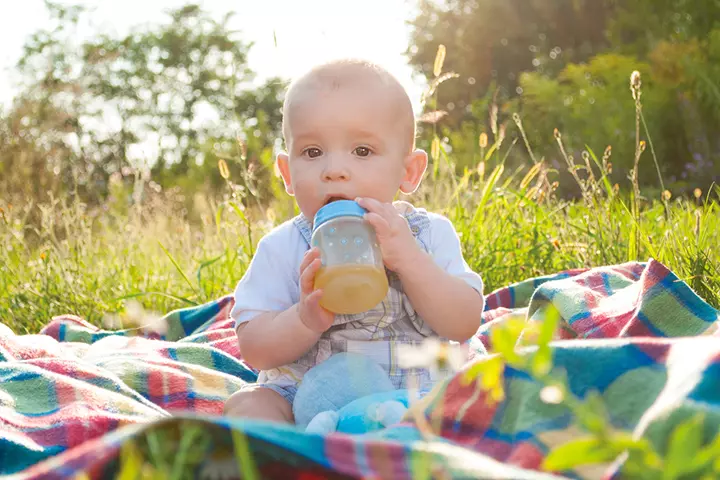
The Centers for Disease Control and Prevention (CDC) advise against feeding added sugar to babies under 24 months (1). According to experts, babies shouldn’t eat sugar alone or as a part of food because sugar adds additional calories to the diet and can cause tooth decay over time. Many mothers tend to add refined sugar to milk. Also, exposing babies to sugar in infancy and early childhood may cause a baby to develop a preference for sweet foods.
An individual with a sweet tooth is highly likely to consume sugar in excess later in life, leading to chronic health issues, such as type-2 diabetes. Therefore, you shouldn’t feed sugary drinks, such as fruit juices, and sugary foods, such as sweet biscuits, to babies (2).
2. Honey
Honey is a natural sweetener and has trace minerals and antioxidants. It is why honey is considered a healthy alternative to sugar. However, babies under 12 months can’t consume honey due to infant botulism risk.
Besides, honey contains considerable amounts of sugar, which confers similar health risks as refined sugar upon overconsumption. Thus, parents shouldn’t feed honey to babies under 12 months (2)(3).
3. Salt
Babies between 7 and 12 months require 0.37 grams of sodium per day (2). According to experts, most healthy, full-term infants can meet this requirement from breast milk or formula. Therefore, you shouldn’t add salt to your baby’s food (3). It is vital because if a baby consumes added salt, it exposes them to excess sodium, which exerts undue stress on their immature kidneys.
Parents should abstain from feeding readymade, highly processed, high-sodium foods, such as chips, crisps, fries, bacon, and sausages. Also, they shouldn’t use stock cubes and gravy to prepare weaning foods for babies since they also contain high sodium quantities. High quantities of sodium or salt can cause hyperosmolarityiA severe condition where the blood becomes concentrated with high levels of salt, potassium, and other substances in the baby, and the baby’s kidneys cannot handle this load.
Julie Cunningham, a mother of two and a dietician, recounts her experience eliminating salty, sugary, and processed foods from her child’s diet. She says, “When my first son was learning to eat, I followed all the usual feeding advice. I avoided sugary and salty snacks and didn’t give him any ‘kid food’ like Lunchables or boxed mac and cheese. He ate whatever we ate and was willing to try most things (i).”
4. Cow’s milk
Whole cow milk can provide several nutrients, but it is not suitable for babies under 12 months(2)
. The recommendation is based on the fact that cow milk lacks essential nutrients, such as vitamin E, iron, and zinc, which a baby needs for healthy growth and development (4). The baby is also likely to develop allergic reactions.
Besides, it has heavy proteins and minerals that put undue stress on a baby’s still-developing kidneys (5). Additionally, these proteins can irritate the baby’s digestive system lining, causing and increasing the risk of iron deficiency anemia (IDA) over time.
5. Cheese
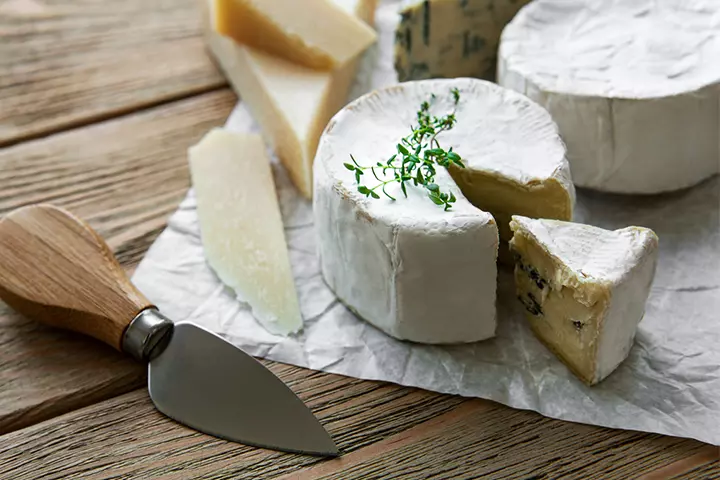
Registered dietitian and client success manager at Omada Health Julie Harris says, “Many types of cheese can be part of a balanced diet for babies, as it is a good source of calcium, protein, and vitamins. Yet, babies should not be fed mold-ripened soft cheeses, like brie, goat cheese, or blue cheese. These types of cheeses have a higher risk of carrying listeria (bacteria). Any cheeses made from unpasteurized milk also carry the extra risk of listeria, and babies (and young kids) should avoid them.”
Listeria is a harmful bacterium that can cause food poisoning. Therefore, check the nutrition label and ingredient list carefully while buying cheese for your baby.
“Also it’s important to watch for milk allergy when serving cheese made from dairy. Since cow’s milk allergy is one of the most common allergies in babies, watch for symptoms when serving cheese during the early months,” notes Harris.
 Quick fact
Quick fact6. Unpasteurized foods
Consuming unpasteurized raw milk, yogurt, cider vinegar, and juices can expose a baby to E. coliiPart of the gut microbiome that is usually harmless but can contaminate food and water to cause diarrhea and fever bacteria. E. coli can cause severe illnesses, such as septicemiaiThe body’s most extreme response to an infection characterized by bacteria entering the bloodstream and meningitisiInflammation of the protective layers surrounding the brain and spinal cord caused by a bacterial or viral infection in babies. The immune system of the baby is unable to handle these bacteria. Therefore, experts advise parents to avoid feeding unpasteurized foods to babies (1).
7. Fruit juices
The American Academy of Pediatrics (AAP) recommends against feeding fruit juices to infants. According to them, fruit juices offer no nutritional value to babies younger than one year. An extra load of sugar is added to the baby’s diet without any nutritional benefit. Besides, fruit juice intake is associated with tooth decay. Toddlers between one and three years can have no more than four ounces of 100 percent fresh or reconstituted fruit juice per day (6).
8. Smoked and cured meat
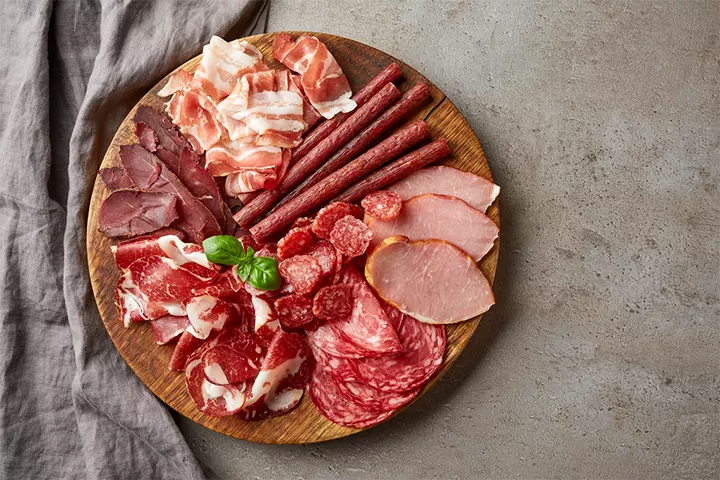
According to registered dietician nutritionist and founder of the Sprint Kitchen, Morgyn Clair, “parents want to make sure they avoid any meats that aren’t fully cooked through to at least a 165-degree internal temperature. Smoked meats sometimes are not cooked to this high degree, which ensures harmful bacteria is killed.”
Besides, smoked or cured meats, such as bacon, bologna, and salami, contain high fat, sodium, and nitrates (2). Hence feeding these foods to babies isn’t recommended. The baby is unable to digest these foods with high fat and sodium content. Hence feeding these foods to babies isn’t recommended.
9. High-mercury fish
Fish is a nutrient-rich food with vital nutrients, such as iodine, zinc, and high-quality lean proteins. Additionally, it has essential omega-3 fatty acids — DHA (docosahexaenoic acid) and EPA (eicosapentaenoic acid) that aid in an infant’s brain development. Therefore, you should feed low-mercury, fatty fishes, such as tuna light and salmon, to your baby. However, you must avoid fishes, such as bigeye tuna, shark, tilefish, and king mackerel, since they are high in mercury (2).
Mercury is a heavy metal that could impair an infant’s neurological development, leading to growth and development issues, such as impaired speech and motor skills development. Therefore, it is vital to avoid high-mercury fish for babies (7).
 Quick fact
Quick fact10. Raw and partially cooked eggs
Eggs are a nutrient-rich source of high-quality protein. Babies can consume well-cooked eggs as a part of a well-balanced weaning diet from six months of age. However, you shouldn’t feed raw and partially cooked eggs since they may pose a risk of salmonellaiBacteria that, when ingested through contaminated food and drink, cause diarrhea, cramps, fever, chills, and headaches and other bacterial infections. According to a CDC report, children younger than five are three times more likely to be hospitalized if they get a Salmonella infection. In addition, there is a risk of developing an allergic reaction.
Bacterial infections can cause food poisoning in babies and adversely harm their immature digestive systems. Some foods containing raw or partially cooked eggs are homemade ice cream, mayonnaise, eggnog, and certain salad dressings (2)(8).
11. Raw sprouts
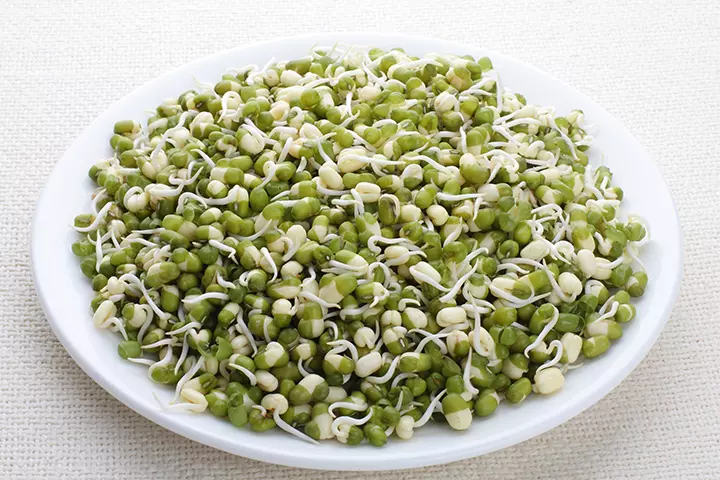
Sprouts, such as alfalfa and mung bean sprouts, are healthy foods that can offer protein, fiber, and several micronutrientsiVitamins and minerals, required in small amounts, that are not produced by the body and need to be taken from different sources . However, feeding raw sprouts to babies isn’t advisable (8)(9). It is because raw sprouts may contain harmful bacteria, such as salmonella and E.coli. These bacteria can cause food poisoning affecting the baby’s health severely. Thus, feed only well-cooked sprouts to babies. Generally, raw foods are avoided in babies due to the risk of infections and difficulty in digestion.
12. Whole nuts and peanuts
Whole nuts, such as almonds, cashew, pistachio, and peanuts, are a potential choking hazard for babies under four years of age (2). So, you must avoid feeding them to babies. However, since these foods are healthy, you can finely chop or powder them before adding them to different weaning foods, such as muffins and porridges.
13. Raw vegetables and fruits
Baby carrots, celery, grapes, corn, and green peas are fruits and veggies that are a potential choking hazard for babies (2). Therefore, babies shouldn’t consume them unless they are cooked thoroughly so that they become soft. Berries are fruits that babies can eat raw but only when quartered.
14. Sticky foods

Raw jelly cubes, chewy fruits, snacks, hard candy, popcorn, marshmallows, and a dollop of peanut butter are some sticky foods you should avoid giving to babies. Since these foods stick to the mouth, swallowing them gets difficult for babies, raising the risk of choking (2). Therefore, experts recommend avoiding these foods for babies until they are four years old.
15. Rice drinks
Rice is a common grain used as a complementary food for babies. However, when it comes to rice drinks, such as rice milk, experts recommend children under five years of age shouldn’t have rice milk as a substitute for breast milk or infant formula (10). It is because rice drinks may have high amounts of inorganic arsenic, which can affect the cognitive development of babies over time (2).
In addition to these, you should avoid giving your little one spicy foods, such as hot dogs, and highly processed foods, such as cakes, donuts, and fries. Also, you need to avoid foods that have triggered an allergic reaction in your baby. Foods that trigger allergies in parents must also be excluded from a child’s diet.
Frequently Asked Questions
1. When can I feed my baby allergenic foods?
Allergy-causing foods should be introduced along with other solid foods. Except for cow’s milk or fortified soy beverages, all allergenic foods may be introduced within 12 months (11) (12).
2. Are there any unsafe liquids for babies?
Honey, unpasteurized juices, unpasteurized milk, artificially sweetened beverages, foods containing alcohol, and drinks containing caffeine are some unsafe liquids for babies (1).
3. How do I know if my baby is allergic to a certain food?
Common signs of food allergies in babies include rash, sneezing, watery eyes, blocked nose, or eczema. If your baby shows any of these symptoms after eating certain foods, it may indicate a food allergy (13).
4. What can I do if my baby accidentally ingests food not recommended for their age?
Most of the items babies accidentally ingest usually pass through their digestive system easily and come out with their feces. However, if the food item gets stuck in the esophagus, it might require immediate medical care (14 ).
5. How can I make sure my one-year-old baby is getting all the nutrients they need while avoiding foods that may be harmful to them?
You can ensure they get all the required nutrients by feeding your baby a well-balanced diet that contains adequate protein sources, legumes, dairy products, vegetables, and fruits (15).
6. What are the best alternatives to the foods babies should avoid?
Instead of refined sugar, consider offering fruits or fresh dates for natural sweetness. For dairy, use formula or breast milk instead of cow’s milk. Always consult with a pediatrician for tailored advice.
Babies older than six months should be exposed to foods from different food groups. However, since the digestive systems of babies under one year are still developing, it is essential to wait until their first birthday before offering them certain foods. You may consult a pediatrician or a certified pediatric nutritionist to get a list of safe foods and foods to avoid for babies. Babies younger than one year may also be more prone to developing allergies. Hence, parents should watch what they are fed.
Infographic: Food Not Suitable For Babies Younger Than One Year
The immunity and digestive abilities of infants develop as they grow. Their tummies may not tolerate some food items until they reach a certain age. Scroll through the infographic below for a list of foods that may be unsuitable for babies below one year of age, along with the risks they entail.
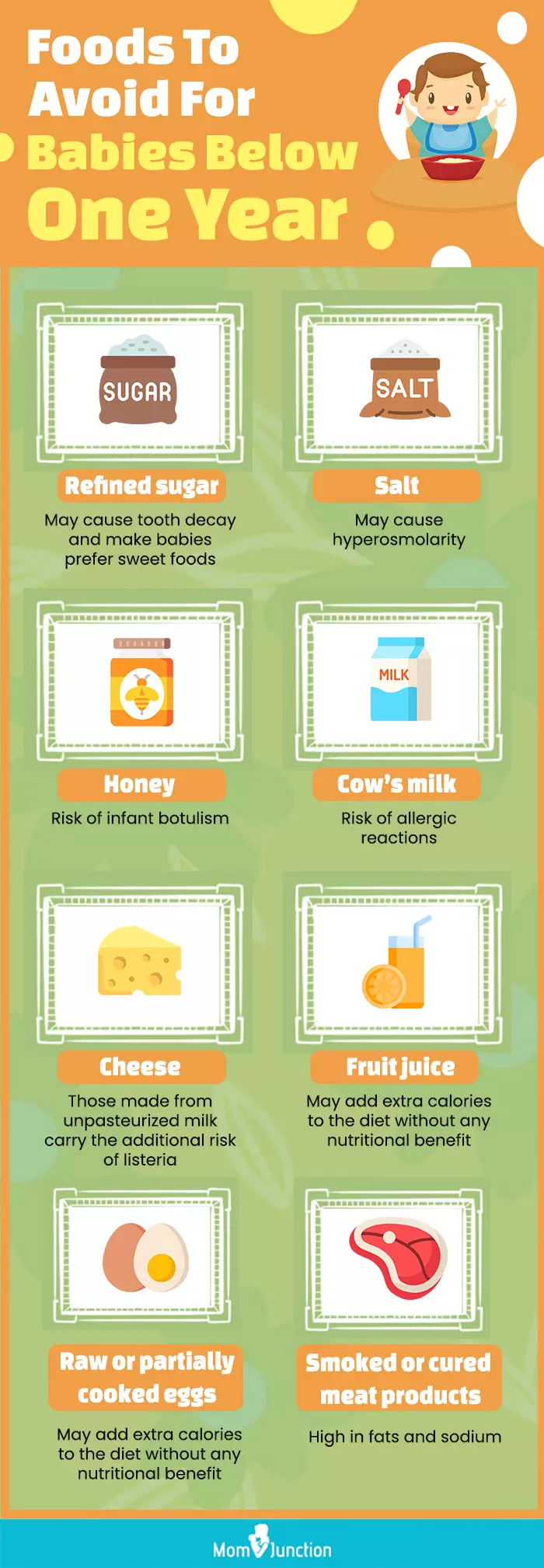
Illustration: Momjunction Design Team
Illustration: Foods You Should Avoid For Babies Younger Than A Year

Image: Stable Diffusion/MomJunction Design Team
Discover essential information on foods to avoid for babies, regardless of baby-led weaning. Safeguard your child by knowing which common foods to steer clear of.
Personal Experience: Source
MomJunction articles include first-hand experiences to provide you with better insights through real-life narratives. Here are the sources of personal accounts referenced in this article.
i. Picky eating or problem feeding? Here’s how to tell the difference;https://medium.com/a-parent-is-born/picky-eating-or-problem-feeding-heres-how-to-tell-the-difference-1ed230e3c7a8
References
1. Foods and Drinks to Limit; CDC
2. Infant Nutrition and Feeding; USDA
3. Foods to avoid giving babies and young children; NHS
4. Alexander KC Leung and Reginald S Sauve; Whole cow’s milk in infancy; NCBI
5. Why Formula Instead of Cow’s Milk?; AAP
6. AAP Recommends No Fruit Juice for Children Under 1 Year; AAP
7. Mercury and health; WHO
8. Food safety information for children ages 5 and under; Government Of Canada
9. Food Safety for Babies’ First Year; British Columbia
10. Tips to Reduce Arsenic in Your Baby’s Diet; AAP
11. How to Introduce Solid Foods to Babies for Allergy Prevention – Frequently Asked Questions (FAQ); Australian society of clinical immunology and allergy
12. When, What, and How to Introduce Solid Foods; CDC
13. Food allergies in babies and young children; NHS
14. Swallowed (ingested) foreign bodies; The Royal Children’s Hospital
15. Feeding your baby: 1–2 years; UNICEF
Community Experiences
Join the conversation and become a part of our nurturing community! Share your stories, experiences, and insights to connect with fellow parents.
Read full bio of Dr. Mubina Agboatwalla
Read full bio of Swati Patwal
Read full bio of Rohit Garoo
Read full bio of Ghazia Shah
















